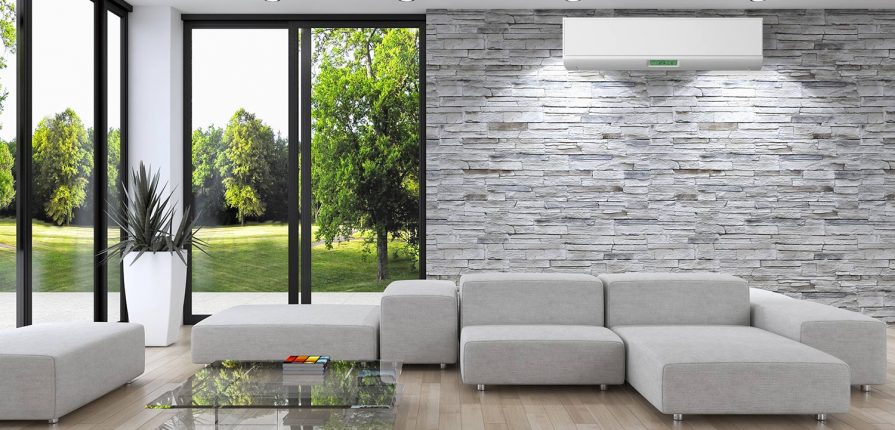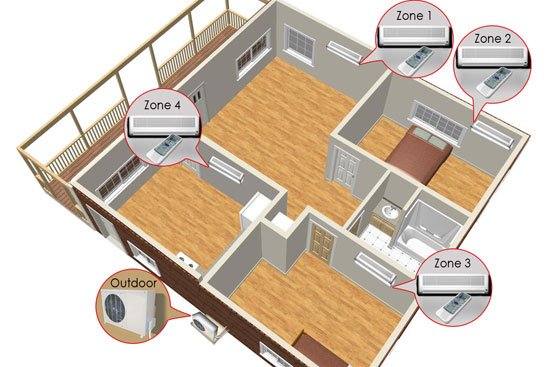Choosing a heating, ventilation, and air conditioning (HVAC) system is a key factor in ensuring comfort and energy efficiency in your home. The right HVAC system affects air quality, comfort level, and energy costs. In this guide, we will review the main aspects that will help you make an informed choice.
What is an HVAC System?
HVAC combines the functions of heating, ventilation, and air conditioning, maintaining a comfortable temperature and air quality indoors. It consists of various components, including furnaces, heat pumps, air conditioners, and ventilation systems, which work together to create an optimal indoor climate in your home.
Types of HVAC Systems
Split Systems:
- Description: Consist of an outdoor and an indoor unit. The outdoor unit contains a compressor and a condenser, while the indoor unit includes an evaporator and a fan.
- Advantages: Well-suited for homes with existing ductwork; provide efficient cooling and heating.
- Disadvantages: Require ductwork; may be less efficient in homes without existing ducts.
Hybrid Systems:
- Description: Combine a heat pump and a traditional furnace, switching between them depending on outdoor temperature.
- Advantages: Provide high energy efficiency, reducing heating costs.
- Disadvantages: Higher initial cost; system complexity may require more frequent maintenance.
Ductless Systems:
- Description: Consist of an outdoor unit and one or more indoor units connected without the use of ductwork.
- Advantages: Ideal for homes without existing ducts; allow for individual temperature control in different zones.
- Disadvantages: Can be more expensive to install; visible indoor units may not blend well with the interior.
Packaged Systems:
- Description: All HVAC components are housed in a single outdoor unit, usually installed on the roof or next to the home.
- Advantages: Save indoor space; simplify installation and maintenance.
- Disadvantages: May be less efficient compared to split systems; exposed to weather conditions.

Factors Influencing HVAC System Choice
- Regional Climate:
In colder regions of the U.S., systems with strong heating capabilities, such as furnaces or hybrid systems, are preferred. In warmer regions, heat pumps and air conditioners are more efficient. - Home Size and Layout:
Larger homes with multiple floors may require a system with zonal control to ensure even temperature distribution. - Energy Efficiency:
Look at SEER (Seasonal Energy Efficiency Ratio) and HSPF (Heating Seasonal Performance Factor) ratings. Higher values indicate better energy efficiency, which can lower electricity bills. - Budget:
Initial cost and installation expenses can vary. It is important to consider not only the upfront costs but also long-term operational expenses. - Existing Ductwork:
If your home already has ductwork, installing a split or hybrid system may be more cost-effective. Otherwise, a ductless option would be ideal.
Popular HVAC Brands and Models in the U.S.
The U.S. market offers many reliable HVAC manufacturers. Among them, Carrier, Trane, and Lennox stand out for their reliability and efficiency. When choosing a brand, it is recommended to consider user reviews and reliability ratings.
Installation and Maintenance Process
Choosing a Qualified Contractor:
Proper HVAC system installation is critical for its efficiency. It is recommended to hire licensed and experienced professionals.
Regular Maintenance:
Scheduled maintenance, including filter replacement and component checks, extends the system’s lifespan and ensures its smooth operation.
Conclusion
Choosing the right HVAC system for your home is an important decision that affects comfort and energy costs. By considering climate conditions, your home’s features, and your budget, you can select a system that provides optimal living conditions. Consulting professionals and thoroughly researching options will help you make the right choice.
FAQ About HVAC Systems
- How often should they be serviced?
It is recommended to have professional HVAC maintenance at least once a year to ensure efficient operation. - What are the signs that indicate the need to replace an old system?
If the system frequently breaks down, energy bills increase, or it fails to provide adequate comfort, it may be time to consider replacement or at least a comprehensive audit and repair. - Can I install an HVAC system myself, or should I hire professionals?
Such installation requires specialized knowledge and skills. Incorrect installation can lead to inefficiency and additional expenses. It is best to entrust this work to professionals.
Did you like this article and find it helpful? Share the link with your friends!
- Published on




